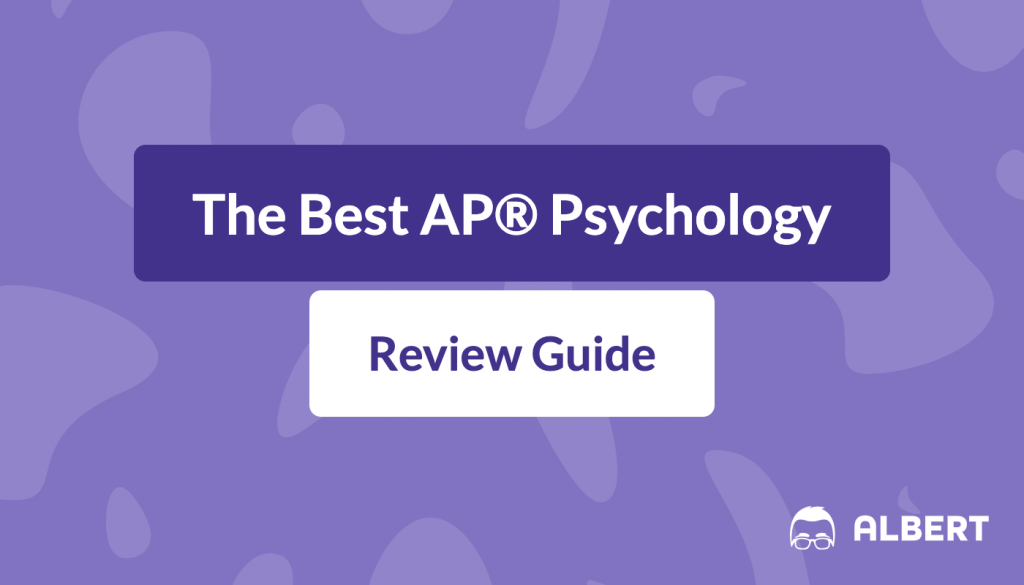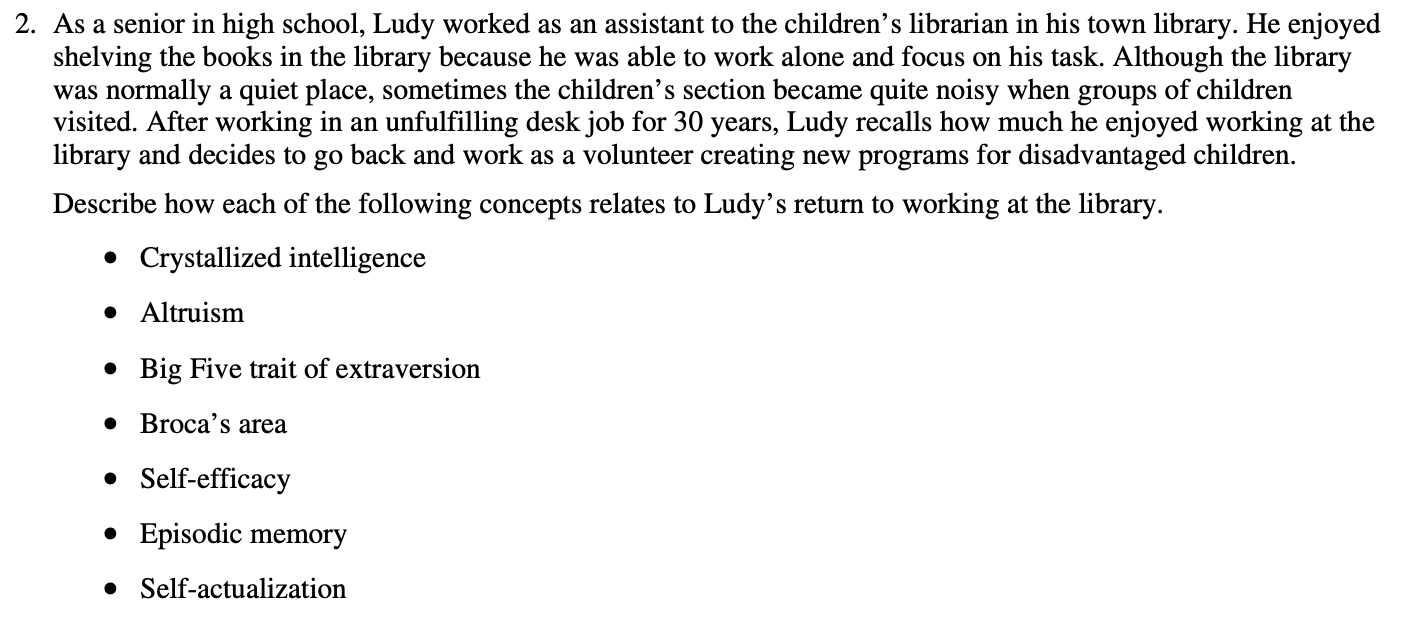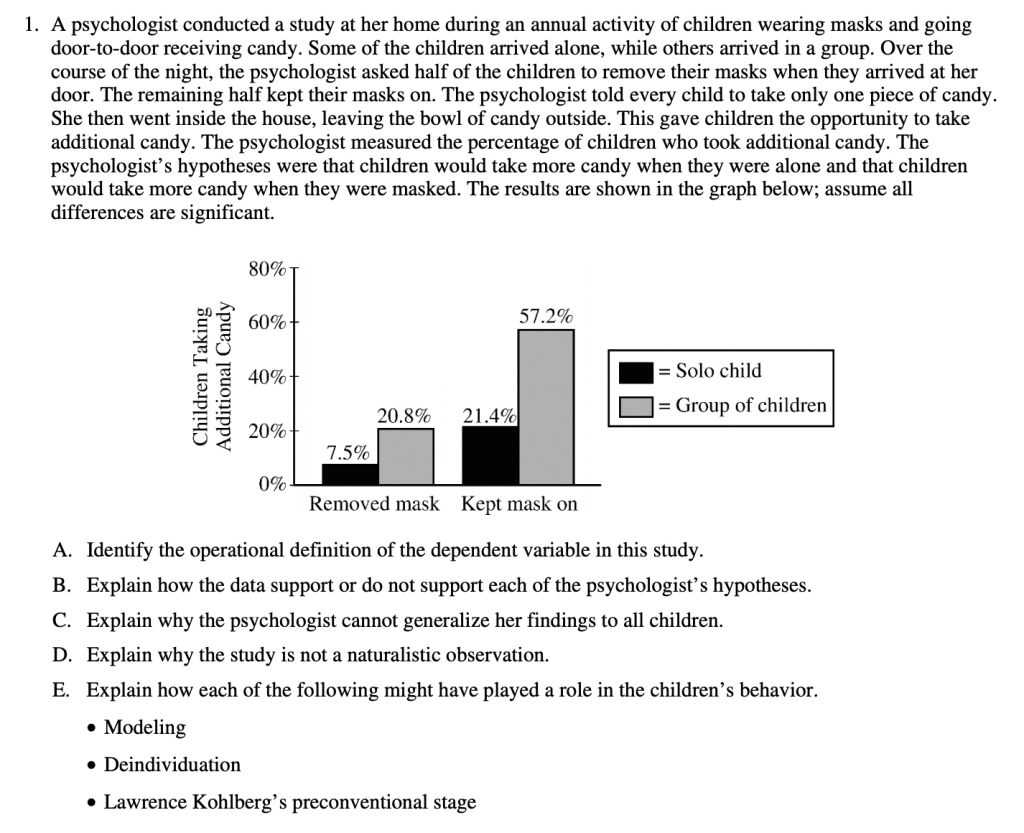The College Board has released the free response questions (FRQs) for the 2023 AP Psychology exam. These questions are designed to assess students' understanding of the key concepts and theories in psychology. Students will have 35 minutes to complete the two FRQs.
The FRQs are divided into two sections: Section I and Section II. Section I contains one question that is worth 50% of the total score. Section II contains two questions that are each worth 25% of the total score.
In this article, we will provide a brief overview of each of the FRQs and offer some tips for answering them successfully.
AP Psychology Free Response Questions
These questions are designed to assess students' understanding of the key concepts and theories in psychology. Students will have 45 minutes to complete the two FRQs.- **Section I** contains one question that is worth 50% of the total score.
- **Section II** contains two questions that are each worth 25% of the total score.
- The FRQs are typically essay questions that require students to demonstrate their knowledge and understanding of psychology.
- Students should be prepared to discuss key concepts, theories, and research findings in their answers.
- It is important to practice answering FRQs under timed conditions in order to improve your chances of success on the exam.
Section I contains one question that is worth 50% of the total score.
This question is typically a long essay question that requires students to demonstrate their understanding of a key concept or theory in psychology. Students may be asked to discuss the strengths and weaknesses of a particular theory, to compare and contrast different theories, or to apply a theory to a real-world situation.
In order to answer this question successfully, students should:
- Have a solid understanding of the key concepts and theories in psychology.
- Be able to think critically about psychological research and theory.
- Be able to write clearly and concisely.
Students should also be aware that the Section I question is typically the most difficult question on the AP Psychology exam. It is important to spend time practicing answering this type of question under timed conditions in order to improve your chances of success on the exam.
Here is an example of a Section I question from a previous AP Psychology exam:
Discuss the strengths and weaknesses of the psychoanalytic theory of personality. In your discussion, be sure to address the following issues:
- The theory's emphasis on unconscious processes
- The theory's focus on childhood experiences
- The theory's lack of scientific testability
**Section II** contains two questions that are each worth 25% of the total score.
These questions are typically shorter essay questions that require students to demonstrate their understanding of a specific topic in psychology. Students may be asked to define a key concept, to describe a research study, or to apply a psychological principle to a real-world situation.- Define a key concept.
These questions require students to provide a clear and concise definition of a key concept in psychology. For example, students may be asked to define the concept of intelligence, the concept of motivation, or the concept of personality.
- Describe a research study.
These questions require students to describe a specific research study in psychology. Students should include information about the purpose of the study, the methods used, and the results of the study. For example, students may be asked to describe the Stanford Prison Experiment or the Milgram Obedience Experiment.
- Apply a psychological principle to a real-world situation.
These questions require students to apply a psychological principle to a real-world situation. For example, students may be asked to apply the principles of social psychology to explain why people are more likely to conform in groups or to apply the principles of cognitive psychology to explain why people are more likely to remember information that is presented in a meaningful way.
In order to answer these questions successfully, students should:
- Have a solid understanding of the key concepts and theories in psychology.
- Be able to think critically about psychological research and theory.
- Be able to write clearly and concisely.
The FRQs are typically essay questions that require students to demonstrate their knowledge and understanding of psychology.
These questions are designed to assess students' ability to think critically about psychological research and theory, and to apply their knowledge to real-world situations.- Define a key concept.
These questions require students to provide a clear and concise definition of a key concept in psychology. For example, students may be asked to define the concept of intelligence, the concept of motivation, or the concept of personality.
- Describe a research study.
These questions require students to describe a specific research study in psychology. Students should include information about the purpose of the study, the methods used, and the results of the study. For example, students may be asked to describe the Stanford Prison Experiment or the Milgram Obedience Experiment.
- Apply a psychological principle to a real-world situation.
These questions require students to apply a psychological principle to a real-world situation. For example, students may be asked to apply the principles of social psychology to explain why people are more likely to conform in groups or to apply the principles of cognitive psychology to explain why people are more likely to remember information that is presented in a meaningful way.
- Compare and contrast two or more theories.
These questions require students to compare and contrast two or more theories in psychology. Students should discuss the similarities and differences between the theories, and evaluate the strengths and weaknesses of each theory.
- Have a solid understanding of the key concepts and theories in psychology.
- Be able to think critically about psychological research and theory.
- Be able to write clearly and concisely.
Students should be prepared to discuss key concepts, theories, and research findings in their answers.
This means that students should be able to define key concepts, explain theories, and discuss research findings in a clear and concise manner. Students should also be able to apply their knowledge to real-world situations.- Define key concepts.
Students should be able to provide clear and concise definitions of key concepts in psychology. For example, students should be able to define the concept of intelligence, the concept of motivation, and the concept of personality.
- Explain theories.
Students should be able to explain the major theories in psychology. For example, students should be able to explain the psychoanalytic theory of personality, the behaviorist theory of learning, and the cognitive theory of development.
- Discuss research findings.
Students should be able to discuss the major research findings in psychology. For example, students should be able to discuss the research findings on the effects of poverty on child development, the research findings on the effectiveness of psychotherapy, and the research findings on the causes of aggression.
- Apply their knowledge to real-world situations.
Students should be able to apply their knowledge of psychology to real-world situations. For example, students should be able to apply the principles of social psychology to explain why people are more likely to conform in groups or to apply the principles of cognitive psychology to explain why people are more likely to remember information that is presented in a meaningful way.
It is important to practice answering FRQs under timed conditions in order to improve your chances of success on the exam.
The AP Psychology exam is a timed exam, so it is important to practice answering FRQs under timed conditions in order to get used to the time constraints. This will help you to learn how to manage your time wisely and to write your answers in a clear and concise manner.
There are a few different ways to practice answering FRQs under timed conditions. One way is to take practice exams under timed conditions. Another way is to join a study group and practice answering FRQs together. You can also find practice FRQs online and set a timer for yourself to see how long it takes you to answer them.
No matter how you choose to practice, it is important to make sure that you are practicing under timed conditions. This will help you to get used to the time constraints and to develop strategies for answering FRQs efficiently.
Here are some tips for answering FRQs under timed conditions:
- Read the question carefully and make sure you understand what is being asked.
- Plan your answer before you start writing. This will help you to organize your thoughts and to write a clear and concise answer.
- Write your answer in a clear and concise manner. Use specific examples and evidence to support your points.
- Proofread your answer before you submit it. This will help you to catch any errors in grammar or spelling.
FAQ
Here are some frequently asked questions about the AP Psychology FRQs:
Question 1: What is the format of the FRQs?
Answer: The FRQs are essay questions that require students to demonstrate their understanding of a key concept or theory in psychology. Students may be asked to discuss the strengths and weaknesses of a particular theory, to compare and contrast different theories, or to apply a theory to a real-world situation.
Question 2: How many FRQs are on the exam?
Answer: There are two FRQs on the AP Psychology exam. Section I contains one question that is worth 50% of the total score. Section II contains two questions that are each worth 25% of the total score.
Question 3: How much time is allotted for the FRQs?
Answer: Students have 45 minutes to complete the two FRQs.
Question 4: What is the best way to prepare for the FRQs?
Answer: The best way to prepare for the FRQs is to practice answering them under timed conditions. This will help you to get used to the time constraints and to develop strategies for answering FRQs efficiently.
Question 5: What are some tips for answering FRQs?
Answer: Here are some tips for answering FRQs:
- Read the question carefully and make sure you understand what is being asked.
- Plan your answer before you start writing. This will help you to organize your thoughts and to write a clear and concise answer.
- Write your answer in a clear and concise manner. Use specific examples and evidence to support your points.
- Proofread your answer before you submit it. This will help you to catch any errors in grammar or spelling.
Question 6: What are some common mistakes that students make on the FRQs?
Answer: Some common mistakes that students make on the FRQs include:
- Not reading the question carefully and misunderstanding what is being asked.
- Not planning their answer before they start writing, which can lead to a disorganized and rambling answer.
- Not writing their answer in a clear and concise manner.
- Not using specific examples and evidence to support their points.
- Not proofreading their answer before submitting it.
By avoiding these common mistakes, you can improve your chances of success on the AP Psychology FRQs.
Tips
Here are some tips for success on the AP Psychology FRQs:
Tip 1: Start preparing early. The FRQs are a challenging part of the AP Psychology exam, so it is important to start preparing early. Begin by reviewing your notes and textbooks, and make sure that you understand the key concepts and theories in psychology.
Tip 2: Practice answering FRQs under timed conditions. The AP Psychology exam is a timed exam, so it is important to practice answering FRQs under timed conditions in order to get used to the time constraints. This will help you to learn how to manage your time wisely and to write your answers in a clear and concise manner.
Tip 3: Use specific examples and evidence to support your points. When answering FRQs, it is important to use specific examples and evidence to support your points. This will help you to demonstrate your understanding of the material and to earn a higher score.
Tip 4: Proofread your answers before submitting them. Before submitting your FRQs, take a few minutes to proofread your answers. This will help you to catch any errors in grammar or spelling, and it will also give you a chance to make sure that your answers are clear and concise.
Conclusion
The AP Psychology FRQs are a challenging but important part of the AP Psychology exam. By understanding the format of the FRQs, practicing answering them under timed conditions, and using specific examples and evidence to support your points, you can improve your chances of success on the exam.
Remember, the FRQs are designed to assess your understanding of the key concepts and theories in psychology. By preparing early and practicing answering FRQs, you can demonstrate your understanding of the material and earn a high score on the exam.



Detail Author:
- Name : Abdullah Ryan
- Username : vfranecki
- Email : sskiles@conn.org
- Birthdate : 1991-01-02
- Address : 94436 Zella Cliff East Darrenbury, WV 31208-2744
- Phone : +1-212-778-3339
- Company : Kris-Olson
- Job : Architectural Drafter OR Civil Drafter
- Bio : Et animi voluptatem minima eaque dolorem. Doloremque repellendus molestias quo et enim et. Ab doloribus ducimus enim ducimus ratione odio. Voluptas et consequatur cupiditate fuga delectus.
Socials
facebook:
- url : https://facebook.com/floyd_wintheiser
- username : floyd_wintheiser
- bio : Soluta deleniti eius expedita vero. Natus corrupti eaque et dolorum.
- followers : 5303
- following : 1562
tiktok:
- url : https://tiktok.com/@floyd.wintheiser
- username : floyd.wintheiser
- bio : Blanditiis nemo aliquid consectetur occaecati ut et saepe sit.
- followers : 5875
- following : 1374
instagram:
- url : https://instagram.com/floyd_dev
- username : floyd_dev
- bio : Nihil tenetur molestias impedit autem illo aut doloribus. Qui unde eveniet provident voluptatum.
- followers : 4535
- following : 2625
linkedin:
- url : https://linkedin.com/in/fwintheiser
- username : fwintheiser
- bio : Error delectus aut adipisci et.
- followers : 380
- following : 2530
twitter:
- url : https://twitter.com/wintheiserf
- username : wintheiserf
- bio : Ut voluptatibus id aut nemo dolores est in. Velit voluptas maxime provident voluptate quidem. Quae quod sed quibusdam sequi.
- followers : 360
- following : 1972